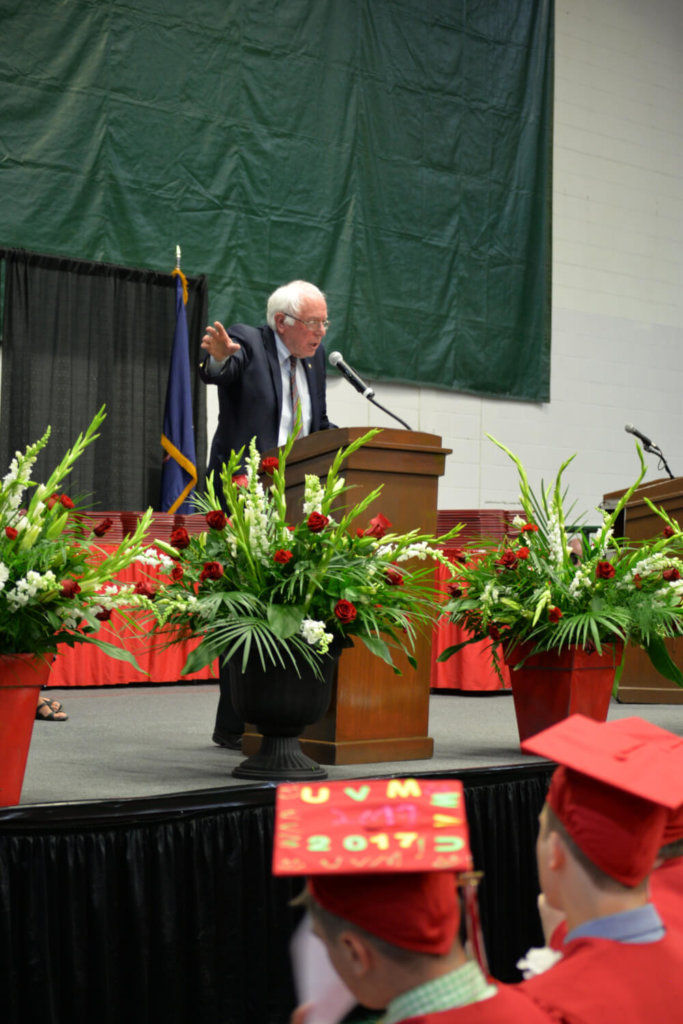Sen. Sanders offers sobering speech at CVU graduation

Thousands filled UVM’s Patrick Gymnasium on Friday, June 16, to celebrate CVU’s graduating class of 2017. It was a commencement that straddled the line between the traditional and the political, with a lineup comprised of student speakers and a guest appearance by Senator Bernie Sanders.
CVU principal, Adam Bunting, initiated the ceremony, asking graduates to give thanks. “I would invite you to stand up and point to someone in the crowd or someone amongst you who helped you get where you are right now.” Graduates jumped to their feet, some standing on chairs, and pointed to family, friends, mentors and teachers in the crowd, some pointing to each other.
The speakers who followed—salutatorian Eva Rocheleau, senior speakers George Davis and Nathan Bamberger and valedictorian Trey Tomasi—reflected on the end of their public-school education with wit, pathos and maturity beyond their years. Each speaker gave the audience a whirlwind tour of their high school careers and discussed their feelings—the exhilaration and the fear—as they stood on the threshold of their post-graduation lives and considered their potential impact on the world.
This sentiment was echoed when Senator Sanders took the podium and delivered a sobering speech that landed somewhere between the campaign trail and the classroom. He praised the speakers for their heartfelt honesty and promised to do the same by providing them with his unvarnished opinions. “I wish from the very, very bottom of my heart that I could tell you that the world that my generation has left your generation is a world with minimal problems, but if I said that I would not be telling you the truth and you know that I would not be telling you the truth.”
With that in mind, Sanders implored students not to lose hope. “I do not want you to walk away from these problems,” said Sanders. “It’s very easy to do that. It’s easy to pick up the paper or look at television and say, my god, it’s all crazy, it’s terrible, I’ve got to worry about other things. But if you turn your backs on the problems, who’s going to fill that gap?”
At the core of Sanders’s message was one plea: democracy is not a spectator’s sport.
“Democracy is a very big deal,” intones Sanders. “It is a very radical concept. You know what it says? It says that you and you and you have the right to determine the future of this state and this nation. That’s a pretty new concept in world history. It’s not a king or a queen or a tsar, it is you.”
Ultimately, his message was one of unity, and he urged graduates to listen to others with respect. Sanders went on to highlight a number of serious social, political, humanitarian and environmental issues that graduates would have to tackle as they moved forward into their adult lives and implored students to use their education to revitalize American democracy and to leave the planet a better place than they found it.
Though Sanders’s speech was well received, bookended as it was by standing ovations, attendees stood divided over its content. One woman from Virginia, who wished to remain anonymous, came to watch her niece graduate. She had high praise for the student speakers, but when it came to Sanders, offered only “no comment” when asked if she thought the speech was appropriate for the venue and the audience, even though she identified as a Sanders supporter.
Graduates themselves offered varying opinions. “I thought it was highly politicized,” said Shane Beal, a Charlotte resident who is heading to the University of Toronto in the fall to major in history, with a double minor in economics and philosophy. “I appreciate some of the messages at the beginning and the end, and the inspiration for us to do more, but at the same time I felt a lot of it was just a recounting of his campaign rather than a message of us.”
Another Charlotte graduate, Becca Cottrell, said, “I thought that it was really impactful, and really meaningful,” Cottrell will study comparative literature, theater and French at UMass Amherst in the fall. She said that Bernie’s warnings and call to action were just the message students needed to hear. “Even if you don’t agree with his political beliefs, I think that it’s important to take into account that the world is in a troubled time and we have to take care of it.”

